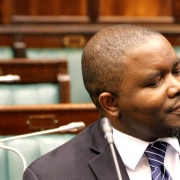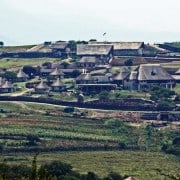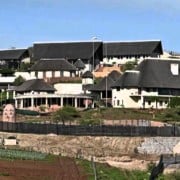|
Getting your Trinity Audio player ready...
|
Public protector Thuli Madonsela yesterday released her report into irregularities, including corruption, maladministration and improper conduct, at the South African Post Office (Sapo). She found that some of the allegations were substantiated, while others were without substance.
Titled Postponed Delivery, the report related mainly to the ten-year lease for Sapo’s new head office at Eco Point Office Park in Centurion, Gauteng, and also to procurement of a catering company and labour broker. It covered a period of 10 years, from 2002 to 2012.
The complaint was brought against the state-owned Sapo in March 2011 by the Communication Workers Union (CWU), which alleged that Sapo did not follow BEE policy when procuring, that Sapo paid millions in rental for a building it did not occupy, that illegal outsourcing took place, that delivery standards were compromised by harsh financial measures, and that Sapo employees and labour brokers were involved in a corrupt relationship.
The CWU was unhappy that it had to wait five years for results, but now that the report is out there, it will bring criminal charges against Sapo.
Bad management and corruption
Madonsela apologised to the post office for the fact that it had found out through the media that the report was being released yesterday. She based her investigation on five questions:
- Did Sapo improperly procure the Eco Point Office Park to accommodate its head office?
- Did Sapo incur fruitless and wasteful expenditure through upfront payment of renal in respect of the office park, amounting to over R3.6-million per month, while the building stood empty prior to occupation?
- Did Sapo improperly appoint a project manager to procure the services of a catering company by the name of Fedics, and did the said procurement amount to illegal outsourcing of Sapo’s supply chain management (SCM) responsibilities?
- Did Sapo improperly implement severe service-indifferent cost-cutting measures that disregarded operational requirements and compromised service excellence across its business units?
- Did Sapo improperly appoint labour brokers with whom some of its employees had a corrupt relationship?
In arriving at the findings and recommendations, Madonsela said she asked herself what happened, what should have happened, and what action could be taken to ensure that people would be where they should have been, had the law been followed.
She found that the first allegation, that of irregular procurement, was substantiated, and the acquisition of the Eco Point premises was “tainted by procurement irregularities and corruption”.
A KPMG report, commissioned in 2011 by the board, had found that there was a corrupt relationship between Centurion Vision Development, owners of the Eco Point Office Park, and a Sapo official.
While the erstwhile Sapo board did act against the officials who had prepared a falsified and misleading business case for moving to Eco Point, Madonsela said the board’s failure to speedily review the deal was in violation of the Constitution – the board’s actions on this point, therefore, amounted to maladministration and improper conduct.
In terms of the second question, Madonsela found that the allegation of fruitless expenditure was substantiated, but the amount in question was R2.4-million per month and not R3.6-million as claimed. The irregular payments that were the subject of the original complaint, she said, were already refunded. However, Sapo did pay some R22-million in upfront rental toward the unoccupied Eco Point premises, which also amounted to maladministration and improper conduct.
Madonsela could not substantiate the allegation that Sapo improperly appointed the procurement company – but she did find that the action amounted to outsourcing of Sapo’s SCM functions and responsibilities. She also found that 56 other contracts were procured through this method, which was part of Sapo’s business restructuring strategy.
This outsourcing, though, did not amount to maladministration and improper conduct, she said.
For the fourth question, Madonsela’s findings were inconclusive. “However, it is a source of concern that Sapo moved to more lavish offices at much higher rental at a time when it was experiencing service-related financial constraints,” she said.
In terms of the final question, Madonsela could also not conclusively say that the relationship between Sapo officials and the labour brokers was corrupt. Those brokers were irregularly appointed, some with no contracts and others with expired contracts. The amount involved was around R2.7-billion.
“As these relationships were not properly regulated … it cannot be said that the runaway expenditure involved did not contribute to Sapo’s current liquidity and cash flow problems,” Madonsela noted.
The remedial action she recommended – after reminding those present that in the absence of a judicial review, the remedial action of the public protector is binding and cannot be ignored, nor can there be a parallel investigation into the matter – was that Sapo recover the R22-million worth of upfront rental. It must also put an end to outsourcing, implement the findings of investigations done by audit firm KPMG and the Special Investigating Unit, and it must immediately submit to the police any evidence pointing to the violation of the Prevention and Combating of Corrupt Activities Act.
Madonsela also instructed the CEO to review corporate SCM processes and ensure that systems are in place to facilitate proper controls and compliance.
Directors have 30 days in which to come up with a plan, she said, adding that her office would follow up after six months.
Post office in decline
The Sapo has suffered a decline over the last few years, one that it attributes to the increasing use of electronic means of communication. However, Sapo has brought many of its woes down on itself – at the end of 2014 workers embarked on a three-month strike that caused havoc at branches and pushed public confidence to new depths. It has also been affected by financial mismanagement, the allegations of fraud and corruption, and the voluntary resignation of its board. At one stage it was unable to pay salaries.
Its new CEO, Mark Barnes, is a former banker who has plans to turn the organisation around. “We have the capacity to get back to the revenue line in our basic business which was in evidence between three and four years ago and we have no greater ambitions than that,” he said at a parliamentary briefing yesterday, just hours before Madonsela released her report.
Barnes revealed that Sapo expects to post a loss of just over R1-billion at the end of this financial year. In 2014/15 it posted a loss of R1.5-billion.
Barnes was appointed shortly before the public protector’s investigation was finalised in January 2016.








